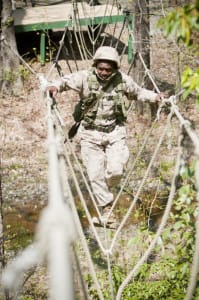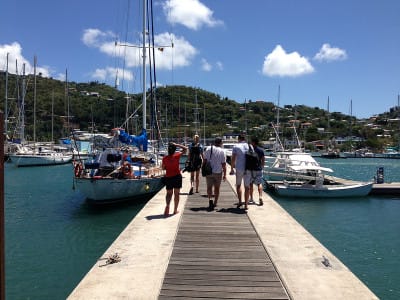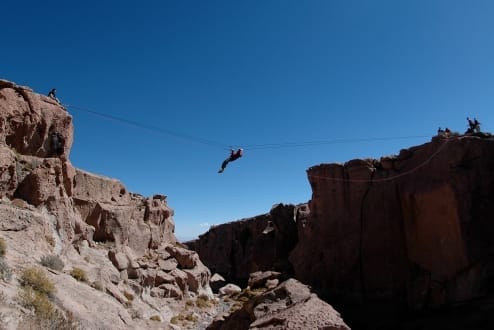It all started with Cotopaxi in January 2012, during my first year at Wharton. Toward the end of that school year, as I became a freshly minted Venture Fellow (VF), I sat in a Huntsman Hall classroom listening to outgoing VFs rattle off their prior expeditions and wondering how I, too, could amass such a collection. Since then, I racked up a few more ventures: Kilimanjaro, FDNY, Quantico and, most recently, Atacama, which was my yearlong labor of love as a VF.
The Leadership Program at Wharton fundamentally shaped who I am, and the Wharton Leadership Venture (WLV) program in particular was bar none the best activity I pursued over the past two years as a Wharton MBA student. So before I re-enter the real world, I feel it important to pay tribute to the program and share some of my reflections.
The mission of Wharton Leadership Ventures is to develop leaders who excel in stressful and ambiguous environments. Regardless of whether I was on a weeklong international expedition or a shorter immersion on U.S. soil, I learned something new on each venture. All told, I emerged with profound lessons and meaningful relationships that I will carry with me for the rest of my life.
Cotopaxi was more than just ice axes, crampons and a whiteout on summit day. I gained a new level of self-awareness, recognizing that I sometimes assume a slightly intimidating leadership persona when thrust into positions of authority, and I also realized the power of owning and investigating my emotions when providing feedback to others and when taking stock of my own abilities.
Kilimanjaro brought a whole new meaning to “team over self” and an acute example of Chris Warner’s wise words that you can “make the peak but miss the point.” It took a harrowing debrief on Summit Day for our team to realize some of our missteps as we ascended the highest peak in Africa, but we all grew to be better people because of it. I also came away with a newfound respect for showering and a memory of the best-tasting energy bar I have ever consumed, hand-fed to me at a moment of weakness after I made the poor decision to carry far too much water weight up the mountain and my face turned a ghastly shade of white.

Learning leadership the Marines’ way at Quantico
While more compact in timing, the day-long experiences at FDNY and Quantico left a lasting impression as well. I gained an even greater respect for the very critical and difficult work that these organizations do. Fighting fires and protecting our nation are both tasks that require a great deal of training, stamina and courage. During the “evolutions”—short training scenarios—that we completed at the FDNY, I came to really appreciate the value of specialization and specific protocols—in other words, having a method to control the madness of traumatic and chaotic situations. Quantico exposed us to a diverse array of scenarios and leadership styles, promoting a versatile approach to problem-solving and the ability to operate in uncertain and risky environments with sound judgment and coordination.
And then there’s Atacama, which I hold near and dear in part because I spent the better part of my second year at Wharton learning about 24 of my classmates, corralling them to complete medical forms, assuring them that it would in fact be cold in the desert, and, ultimately, hoping to help them have one of the most meaningful and transformative journeys they would experience at Wharton. Serving as a Venture Fellow was a privilege and an honor: to be a facilitator and coach among peers is truly humbling, but it’s also a lot of fun. As a participant, I was so caught up in the experience itself that it was sometimes difficult to extricate myself from my team and my own behaviors to deeply appreciate the broader context in which we operated. But as a Venture Fellow, I was able to be an astute observer, meandering from the front to back of the pack, capturing moments of decision and indecision, of conflict and unity. I could interject with questions or help set the precedent for the value of a difficult conversation. From this perspective, it was an entirely new and wonderful learning experience for me.
The Atacama venture is unique in that it offers a multisport adventure: trekking, rock climbing, canyoning, mountain biking and mountaineering through the driest desert in the world. As such, individuals and teams are tested in a variety of circumstances, each commanding a different approach: protocols, preparation, and clear communication to reach the summit, coaching and support to bolster teammates ascending the rock wall, and decisiveness to ford the cold, wide river for the very first time. Each activity introduces a fresh challenge and offers another opportunity for teammates to learn about each other, as someone’s strength in one activity could be a liability in another. Different circumstances give everyone an opportunity to shine and to make and learn from mistakes.

Rest assured, the sailing will not all be smooth on this WLV to Grenada.
So, what do I have to show from two years in the Wharton Venture Program? The most REI dividends I have ever accrued, thousands of breathtaking photos, some interesting nicknames, a love of Gore-Tex and an unexpected liking for instant soup, to name a few.
But aside from all that, I have memories that I will cherish forever and experiences that have made me a more resilient, self-aware and dynamic leader. When I signed up for Cotopaxi, I knew it wasn’t going to be a typical holiday. There were moments of discomfort in each of these experiences—numb fingers and toes, difficult personalities, constricting oxygen masks, heavy gear, utter fatigue, awkward silences—but the nexus of that stress, ambiguity and challenge creates experiences where we learn the best and learn the most. Ultimately, we should all be cold, tired, and hungry once in a while.


























